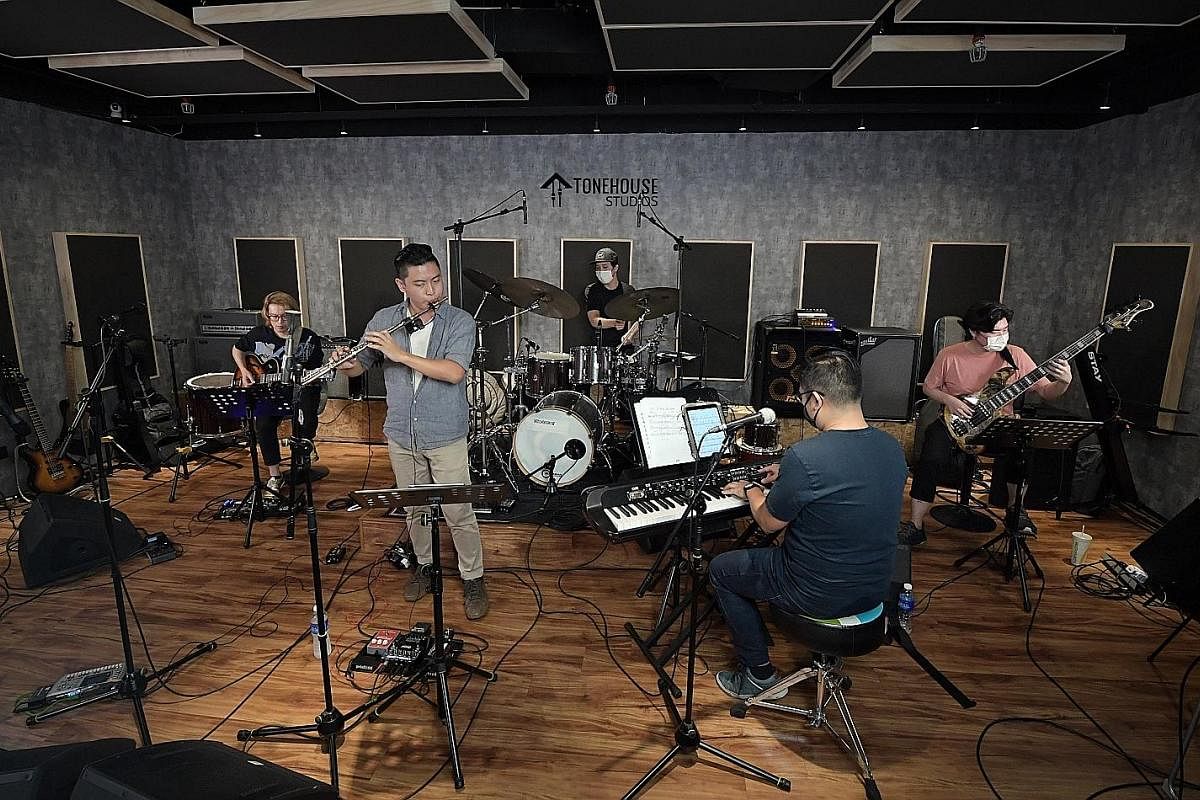Music studios in a jam
Hard hit by Covid-19, some jamming studios have closed for good, while others are trying to drum up business with new services such as live streaming


Reza Global Productions' rehearsal spaces used to throb with the sound of music, but the company was forced to close its 15-year-old jamming studios for good in May.
Founder and owner Mohamed Roslan estimates that his business, which includes equipment rental, had dropped by 90 per cent compared with the pre-pandemic days.
"I've lost about $40,000 in business since the start of the year. We couldn't carry on so we decided to sell off some of the equipment and close the studios," says the 48-year-old, who first opened his studios under a different name, O'lando, in 2005. He now relies on the rental business for income.
Like many other businesses in Singapore, jamming studios - an essential part of the music scene here - have been hard hit by the Covid-19 pandemic. It is estimated that there are over 40 jamming studios dotted around Singapore, with rates that range from $10 to more than $70 an hour. Many of them are small-scale establishments, offering a range of one to five studios each and are owned by people who love music or are musicians themselves.
While some have permanently shuttered, others have had to innovate and offer new services such as live streaming.
Jamming studios were among the businesses closed when the circuit breaker started in April. They were allowed to open again in June, but with new restrictions. For example, the equipment has to be regularly disinfected and musicians must adhere to social distancing rules.
With live entertainment still curtailed to prevent the spread of Covid-19, fewer bands need to rent space for rehearsals and music lessons.
Mohamed Noor, one of the local scene's most sought-after percussionists, says that musicians are finding it hard to hire studios because they are earning less during the pandemic. "My income from music is only 20 per cent of what I used to earn before the pandemic," says the 53-year-old.
Jamming studios are essential to the music ecosystem here.
Singer and songwriter Rai Kannu, 42, one-half of singing duo Jack & Rai, says they have played an important role in his development as a musician.
"The rite of passage for any band's live debut is to jam together. The jam studio has always been an entity that exists to grow that interest in music and cohesion as a band. As a kid, I used to go regularly to Wee Lee Music Centre, which exists till today."
Studio owner and musician Bani Rahman, 49, adds: "In Singapore, we can't play our instruments loud at home because we might disturb the neighbours, which is why jamming studios are so important to us.
"It's also more than just a room for us to play, it's a community space for musicians to gather and socialise."
The bassist runs Epic Studio at Peninsula Shopping Centre. While he is relieved that he received three months of rental rebates for the two units that he rented from two different landlords, income is still tight as he had to pay maintenance fees to one of the landlords while the studio was closed during the circuit breaker.
For Tonehouse Studios in Parklane Shopping Mall, the circuit breaker period was a chance for it to explore new ventures.
Director Mah Chen Zhong started a podcast while the studio was closed. And when it reopened, it started offering live-streaming services for musicians.
The studio also started its own online gig series, Tonehouse Live Sessions, as well as Tonehouse Live Streaming Sessions, a project in which bands cover made-in-Singapore songs and talk about why they liked them.
The 31-year-old says: "The initial investment into live-streaming equipment was steep, but it is paying off.
"More importantly, the big picture is about providing a quality venue for musicians to continue to perform and keep the market going. We feel grateful that we're able to play a small role in keeping things going for the arts and music scene."
The Basement Studio in Golden Mile Tower is another studio that has revamped its business in the wake of the pandemic.
It began offering live-streaming services to musicians. Owner Mohamed Yazzit Mohamed Ismail has also started organising online gigs at the studio. Viewers are encouraged to pay the performers via Buy Me A Coffee, an online platform that lets fans provide monetary support to creators.
The 40-year-old's plan is for The Basement Studio to evolve from a jamming studio to a record label over the next one year. "We want to do more live-stream shows as well as discover and promote new talent."
Still, for many jamming studios in Singapore, business is only about half of what it was before the pandemic.
"It's been very hard for me," says Mr Sam Ng, who operates Wee Lee Music Centre, a jamming studio in Aljunied that was started in 1983.
"Musicians are out of a job so they don't come here to practise."
He has had to let go of his three staff during the circuit breaker period when the studio was closed. The 53-year-old now operates the studio alone.
"I give myself until the end of December, and if business does not improve, I might have to wind up."
Another business owner who was affected, Mr Hafiz John Dzulkifli, had to downsize his music business in March.
His company, What's Your Jam?, used to have a unit that comprised jamming studios, a music school and retail shop in Kampong Bahru Road.
He closed down the two-year-old jamming studios and relocated to a smaller space in the same area that is used only for music lessons.
"My partners and I did our calculations and since there were fewer people coming to jam, we decided to close down the jamming studios to prevent further losses."
For gig-starved musicians like Martin Reyes, leader of Latin music group Martin Reyes Band, the local studios' new services helping them take their music online are much welcomed.
On Sept 19, his six-member band, which used to play at private events as well as venues like The Fullerton Hotel Singapore, will be doing a ticketed online performance that will be live-streamed from The Basement Studio. It will be their first performance since February.
"The whole entertainment scene has been affected by the pandemic so we have to find creative ways to generate income," says the 43-year-old. "Being able to do live-stream shows at the studio helps us to keep in contact with our crowd, the people who miss our live performances."
Join ST's Telegram channel and get the latest breaking news delivered to you.
A version of this article appeared in the print edition of The Straits Times on September 10, 2020, with the headline Music studios in a jam. Subscribe

